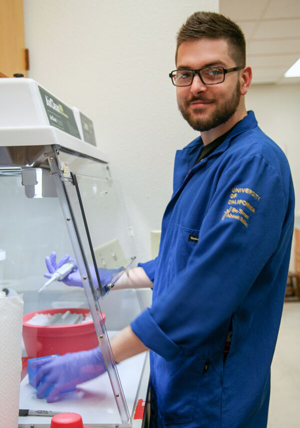Sanjin Mehic's parents left everything behind when they fled the genocide, mass rapes, and repeated shellings of war-torn Bosnia-Herzegovina for the quieter streets of San Jose, Calif.
His father, a businessman and economist, got a job painting cars in an auto body shop. His mother studied English and found work as an account manager in the biotech industry.
"My parents worked hard to get going and never looked back," said Mehic (Porter '16, biochemistry and molecular biology).
For Mehic, 24, that industriousness shaped his own life. Besides regular classes and schoolwork at UC Santa Cruz, Mehic is engaged in a research study that focuses on the role of bacteria in the production of an algal toxin called domoic acid in the Monterey Bay. Domoic acid not only kills marine organisms but also can cause neurological damage, sometimes fatal, in humans.
"I basically live inside the lab," Mehic said, with a laugh. "People ask me where's my sleeping bag."
Early on, Mehic didn't care much for school, but a community college pre-nursing course in organic chemistry changed that view.
"My brain and science just clicked," he said.
His interest landed him a summer research internship for community college students at UC Santa Cruz and eventually a place in the lab run by Assistant Professor of Ocean Sciences Marilou Sison-Mangus.
Thanks to Sison-Mangus and a grant from the Dean's Fund for Undergraduate Research, Mehic is engaged in a study to determine whether certain bacteria influence production of domoic acid during algal blooms.
"Sanjin has an intense passion about the research that he does, be it in the realm of microbiology, chemistry, or molecular biology," Sison-Mangus said. "He volunteers and involves himself in many research activities in my lab. He never leaves a question unanswered, and he does not limit himself to what he can do."
For Mehic's part, scientific research is creative, exciting, and leaves a lot of room for self-motivation. He said he came into UC Santa Cruz with five years of community college experience but that working in the lab not only taught him to think critically but also allowed him to share knowledge with a community of scientists. Eventually, he said, he'd like to get his Ph.D.
Sison-Mangus sees undergraduate research as "a venue for cultivating a student's confidence and maturity." Under the watch of experienced supervisors, she said, "they grow and learn how to be independent thinkers and doers. Doing research is not only about gathering data but also analyzing, writing, and presenting it to peers.
"Undergraduate research hones students in many ways and makes them well-prepared for outside challenges once they graduate from the university," she said.
In fact, a 2014 UC Santa Cruz study showed, 78 percent of graduating seniors reported that learning research methods was important to them as part of their educational experience.
For Mehic, the ability to pursue undergraduate research gave him an avenue for his passion.
"Once you find the thing you love to do," he said, "it's hard to separate yourself from it."


